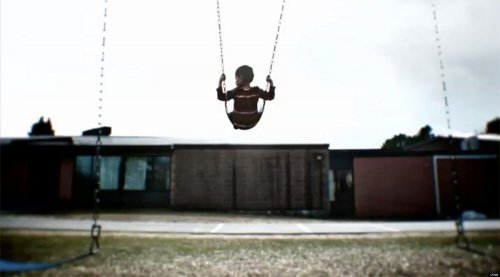How Does Parental Absence Affect Children?

Children benefit from a healthy relationship with both parents, but circumstances can sometimes make this impossible. In this article we’ll explain how parental absence affects children.
Death, divorce or another unpleasant event can leave a child without one of his or her parents. If this happens, it’s necessary to know how to deal with the long-term emotional effects that parental absence can cause.
How does parental absence affect children?
Parents are a source of comfort and warmth for their children. With one or both parents absent, adolescents can be deprived of necessary attention.
When the mother or father is absent from the home, children may suffer and feel they don’t have all the support they need.
To hide this vulnerability and possibly counteract it, some young people may, among other things, become aggressive with the intention of intimidating others before becoming victims themselves. However, not all children suffer the effects of parental absence in the same way.
Problems related to parental absence
Parental absence can be complicated for children. Therefore, problems such as the following can arise:
1. Problematic relationships
When a child or teenager loses a parent, this indirectly affects his or her relationship with others. A prevailing consequence is problematic relationships. The adolescent can develop a poor image of himself and become increasingly resentful, in addition to fearing greater abandonment.

2. Cognitive effects
Single-parent households are more likely to have adolescents with lower cognitive abilities, according to a study in The Journal of Human Resources. A contributing factor is less participation of adults in the teenager’s education. One way to combat this is to find support through community or family participation.
3. Aggression
A teenager who lacks a parent may be dealing with resentment, which can manifest as aggression. Parental influence in a child’s early years teaches him the appropriate responses and actions to face aggression.
When one of the parents is missing, these lessons may go unnoticed. When reaching adolescence, the young person is more likely to be left with the inability to deal appropriately with his own aggression.
Single-parent households are more likely to have adolescents with lower cognitive capacities.
4. Anxiety
The child may be prone to episodes of anxiety. That’s because a child without a parent hasn’t had the intimacy and closeness that a healthy relationship provides with an attachment figure.
Along with hyperactivity, anxiety problems can arise that are related to maternal or paternal separation. For teenagers, this can cause problems with academic performance.
5. Academic performance
A normal family structure has a positive impact on the adolescent’s academic performance. Parents encourage their children to do better in school, while adolescents remain motivated by the desire to make adults feel proud of them.
With absent parents, adolescents lose their key motivational factor and, therefore, worry very little about the grades they get in school.

6. Drug and alcohol abuse
Adolescents with absent parents are more likely to fall into drug addiction or consume alcohol before reaching the legal age to do so. By not having someone nearby to control them, they begin to be responsible for their own freedom. As a result, they don’t always use it properly.
In fact, research has shown that parental absence increases the risk of children drinking and smoking before becoming teenagers.
Finally, remember that parental absence can have a greater impact on little ones. However, not all children are the same, so know that it won’t affect them all in the same way. In these cases, the most important thing is to pay attention to them and give them affection, in addition to always being present and listening to their concerns.
All cited sources were thoroughly reviewed by our team to ensure their quality, reliability, currency, and validity. The bibliography of this article was considered reliable and of academic or scientific accuracy.
-
Bermúdez, E. A. A. (2020). Estructuración de la personalidad en niños y niñas abandonados por sus progenitores. Psicología desde el Caribe. https://rcientificas.uninorte.edu.co/index.php/psicologia/article/view/8428
- Lacey, R. E., Zilanawala, A., Webb, E., Abell, J., & Bell, S. (2018). Parental absence in early childhood and onset of smoking and alcohol consumption before adolescence. Archives of disease in childhood, 103(7), 691-694. https://adc.bmj.com/content/103/7/691
- López, G. A. A., Aldaz, J. H., Ortuño, K. G., & Masache, C. D. (2023). Familia y comunidad en el desempeño académico. Revista Multidisciplinaria de Desarrollo Agropecuario. 5(3), 8-8. https://dateh.es/index.php/main/article/view/238
-
Ramírez, F. B., Misol, R. C., Alonso, M. D. C. F., Tizón, J. L., & de Salud Mental, M. D. G. (2022). Prevención de los trastornos de la salud mental. Hijos de familias monoparentales. Atencion Primaria, 54(Suppl 1). https://www.ncbi.nlm.nih.gov/pmc/articles/PMC9705223/
- Wang, Y., Lu, Y., Du, M., Hussein, N. M., Li, L., Wang, Y., … & Fu, Y. (2022). Altered spontaneous brain activity in left-behind children: a resting-state functional MRI study. Frontiers in Neurology, 13, 834458. https://www.frontiersin.org/articles/10.3389/fneur.2022.834458/full
This text is provided for informational purposes only and does not replace consultation with a professional. If in doubt, consult your specialist.








